We’ve counted your votes—all 3000 of them—winnowed out the duplicates over many a night of pizza and wine, and arrived at the winners of the 2011 Tor.com Readers’ Choice Awards!
The poll gave us a couple of interesting turns during and after the voting and it would be safe to say it took on a life of its own. (Note to selves: Never build a robot.) You’ll find more commentary from us in that regard after the results.
But first, let’s look below for the top ten most voted on titles in the categories of Novel, Short Fiction, Covers, and Comics.
The top ten most voted on Novels are:
-
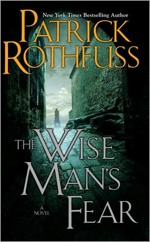 The Wise Man’s Fear by Patrick Rothfuss (140 votes)
The Wise Man’s Fear by Patrick Rothfuss (140 votes) - The All-Pro by Scott Sigler (105 votes)
- The Alloy of Law by Brandon Sanderson (63 votes)
- The Seventh Throne by Stephen Zimmer (63 votes)
- Ready Player One by Ernest Cline (55 votes)
- The Final Arbiter by Mark Rivera (55 votes)
- A Dance With Dragons by George R. R. Martin (53 votes)
- Fuzzy Nation by John Scalzi (52 votes)
- Dancing With Eternity by J.P. Lowrie (50 votes)
- Among Others by Jo Walton (49 votes)
Patrick Rothfuss took the top slot by a substantial margin, although Scott Sigler’s The All-Pro was neck and neck with The Wise Man’s Fear for nearly the entire length of the poll. Voting was consistent for The Wise Man’s Fear throughout the entire 10-day length of voting, whereas fans of The All-Pro came out in bursts throughout the 10 days. In this case, slow and steady ended up winning the race.
The top ten in the Novel category ended up being evenly split between books with active social/author campaigns behind them and books that garnered votes without that assistance. This pattern appeared about halfway through the voting and basically solidified there, with the top ten books as of that point mostly remaining the top ten books, barring minute changes in position within that established top ten.
This remains the case with the final results and considering how close the race is between a lot of these titles, the line-up would have undoubtedly continued to jump around in place, although Wise Man’s Fear most likely would have widened the gap between it and the other nine titles.
This isn’t the first time Patrick Rothfuss has found a groundswell of support on Tor.com. His debut novel, The Name of the Wind, placed third in our Best SFF Novels of the Decade Readers’ Poll.
There is a definite correlation between titles that didn’t have author campaigns behind them—The Wise Man’s Fear, The Alloy of Law, Ready Player One, Among Others, and to a smaller extent A Dance With Dragons —and their presence on Tor.com. Our coverage of Patrick Rothfuss, Brandon Sanderson, and George R. R. Martin is extensive, and Jo Walton, the author of Among Others, has written over 500 posts on the site!
This leaves Ready Player One by Ernest Cline as a fascinating outlier. We couldn’t find any visible or insistent request from Cline or the book’s publisher regarding voting for it, and our coverage of it is practically microscopic in comparison to the above-mentioned titles. It should also be noted that Embassytown by China Mieville was one vote shy of the top ten, and would fit this classification, as well.
The top ten most voted on pieces of Short Fiction were:
-
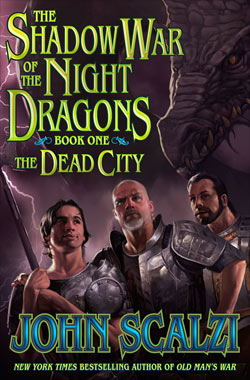
“The Shadow War of the Night Dragons, Book One: The Dead City“ by John Scalzi (appearing on Tor.com) – 108 votes
- “The Windfarmer’s Guest” by Lucas Ahlsen (appearing in Abyss & Apex) – 69 votes
- “All Mimsy” by Kelly Wright (appearing on FlashFictionOnline.com) – 50 votes
- “An Island Sojourn” by Stephen Zimmer (appearing in Dreams of Steam) – 23 votes
- “Awakening of Evarun, Part 1″ by Tom Barczak – 16 votes
- “Absinthe Fish” by M. David Blake (appearing in Bull Spec) – 9 votes
- “Houses” by Mark Pantoja (appearing in Lightspeed) – 8 votes
- “Infinity Blade: Awakening” by Brandon Sanderson – 6 votes
- “The Dala Horse“ by Michael Swanwick (appearing on Tor.com) – 5 votes
Once John Scalzi threatened to rescue kittens if you voted for his short story, nobody else in this category stood a chance. (And if you visit the link above, you’ll see he actually followed through on that. Great job rescuing kittens, internet!)
(Also, just a quick housekeeping note: The list of short stories that garnered 4 votes each is fairly long, so we capped this list at 9.)
For those unfamiliar with Scalzi’s story, its origin can be traced back to our Best SFF Novels of the Decade Readers’ Poll and the subsequent data it generated in regards to most used words in fantasy titles. We joked that “Shadow War of the etc etc etc.” would be a powerhouse of a fantasy tale and lo, John Scalzi made our dreams come true a few weeks later. The short story topping the Short Fiction top ten offers a sweet postscript to that.
In all seriousness, the results in this category were perhaps the most revealing of all in regards to the format it covered. The number of professional SFF short fiction outlets has expanded massively in the last ten years and story submissions have kept pace right along with that.
Yet, votes on short fiction were a mile wide and an inch thick. Only 9 pieces of short fiction got more than 4 votes. In comparison, 50 novels were voted on more than 4 times. Additionally, the top 6 pieces of short fiction benefitted from author campaigns, whereas the top 50 novels lean more towards merit-based votes.
Granted, this isn’t a lot of data with which to draw any conclusion, but it did become an additional piece of data for something we’ll talking about a bit further down.
The top ten most voted on Covers were:
-
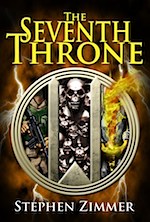 The Seventh Throne by Stephen Zimmer, cover by Matthew Perry (55 votes)
The Seventh Throne by Stephen Zimmer, cover by Matthew Perry (55 votes) - Dragon Fate by J.D. Hallowell, cover credits not listed (27 votes)
- Deathless by Catherynne M. Valente, cover by Beth White, design by Peter Lutjen (20 votes) – See how the cover to Deathless was created.
- The All-Pro by Scott Sigler, cover design by Donna Mugavero (20 votes)
- Leviathan Wakes by James S. A. Corey, cover by Daniel Dociu (19 votes)
- The Alloy of Law by Brandon Sanderson, cover by Chris McGrath (18 votes)
- Towers of Midnight ebook edition by Robert Jordan and Brandon Sanderson, cover by Raymond Swanland (12 votes)
- Reamde by Neal Stephenson, cover design not listed (11 votes)
- Across Thin Ice by Tess Garman & Teagan Gavet, cover by same (11 votes)
- God’s Eye by A.J. Scudiere, cover by Ruke, design by Greenleaf Book Group LLC and Alex Head (8 votes)
Matthew Perry wins the Cover vote for the cover to Stephen Zimmer’s The Seventh Throne. This cover took the lead very early on in the poll and never let up.
The votes in the Cover category were telling, as nearly every vote for a cover was including along with a vote for that book as Best Novel (or in the case of Across Thin Ice, best Comic). It was rare to find a voter who considered a cover without including the merits of the author and it highlights an interesting conundrum in regards to book covers. The teams behind book covers are very often separate from the authors themselves, and yet that separation doesn’t exist in the minds of most readers. At this point, is it possible for them to exist separately if you’re not accustomed to detecting a designer and artist’s technique?
The top ten most voted on Comics were:
-
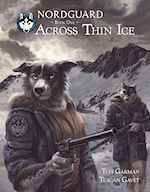 Across Thin Ice – 71 votes
Across Thin Ice – 71 votes - Girl Genius – 20 votes
- XKCD – 20 votes
- The Order of the Stick – 12 votes
- Schlock Mercenary – 8 votes
- The Unwritten – 7 votes
- Questionable Content – 5 votes
- Animal Man (The New 52) – 4 votes
- Locke & Key: Clockworks – 4 votes
- TURF – 3 votes
An author campaign shot Across Thin Ice by Tess Garman & Teagan Gavet to the top slot in the Comics category, which it held for the remainder of the poll. Along with Covers, Comics was a mostly exploratory category in that it was included in the poll mostly because we were curious as to what kind of information would result from the casting of votes. Comics ended up being a bit all over the map, however, with only the top 3 choices garnering any significant votes.
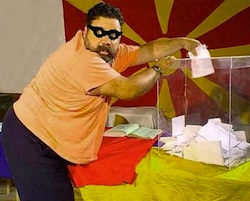 How We Counted Votes:
How We Counted Votes:
Shenanigans were called quite early on in the Readers’ Choice Awards poll due to sudden and active campaigning on the part of several authors. Although this activity annoyed many of our usual readers, the waves of votes for single authors fell well within the behavior we were expecting to find. (In fact, considering it was an open readers’ poll, we were expecting far more than what actually resulted.) Our approach was to count every vote regardless of source during the daily updates, then check for sockpuppeting, duplicates, and so on during the recount.
The check did eliminate a lot of votes, the majority of them being for books that were being promoted through author campaigns. What was suprising in this regard was that a good number of the duplicate votes were not direct ballot-stuffing actions but rather due to blind loyalty, enthusiasm, or simple mistakes on the part of the voter.
Our search for duplicates began with email address, IP addresses, and other related information. If something suspicious came up, we’d dig deeper and piece together the user’s entire activity on the site or do further research into the location a certain batch of votes was coming from. Sometimes votes came up clean (there’s a particular architectural firm out there that really loves a certain title!) and sometimes they came up completely dirty (many anagrams of a couple usernames does not a clever disguise make).
For the most part, though, duplicate votes tended to be people being pretty innocently enthusiastic, voting once a day like clockwork or hitting the submit button too many times in a row. We expected to find duplicate votes, but we didn’t expect the majority of them to be simple human error, done without malice. That was an interesting revelation to come across and it’s quite nice to see that a poll that was essentially running on the honor system conducted itself with honor.
What We Learned:
The Best SFF Novels of the Decade Readers’ Poll we ran last year was a hell of a lot of work, but also a hell of a lot of fun, so we were curious to see if that would translate to a much shorter timespan. Additionally, 2011 was a huge and varied year for releases in science fiction and fantasy, and we were curious as to what stood out the most in what is already an overwhelmingly colorful pack.
We got that to an extent, but another narrative took over the Readers’ Choice Awards, one we did not expect to come out in such force: The mechanics of online promotion.
The number of votes we received and the size of the audience we were reaching lent itself perfectly to spotlighting the effects that personal promotional efforts have on the success and awareness of a book. Authors are often pressed to create an online presence, whether it’s through a publicity department at a major publisher or through friends and family that want to see your book hit big.
With few exceptions, authors taking advantage of their existing online presence were by far the most active competition in this poll. We kept tabs of this activity early on and watched with fascination at the various approaches being taken. Scott Sigler kept his fans excited about maintaining his lead by presenting it with the same themes that appeal to fans of his books: this is a competition and you are rooting for a team. Stephen Zimmer presented himself as the underdog to his friends and family and kept that narrative going throughout the poll. John Scalzi got jocular with it and saved a kitten, reminding his fans of the same humorous qualities that they liked about his short story.
These authors didn’t just ask their fans to support them, they made the act of support something interesting in and of itself. There was reward, escalation, narrative, and an endpoint. And those narratives echoed the same qualities that the fans responded to in the author and/or their work.
As the poll continued, watching this technique unfold seemingly by itself was fascinating. We were watching a concept that seems completely ephemeral—”create an online presence”—as a mechanical process, proceeding bit by bit. To put it crudely, there was the sausage being made, right in front of us.
Was it we were expecting? Nah. But it was interesting. More interesting than a horse race has any call to be.
Thanks for voting, everyone. Congratulations to all of the winners!




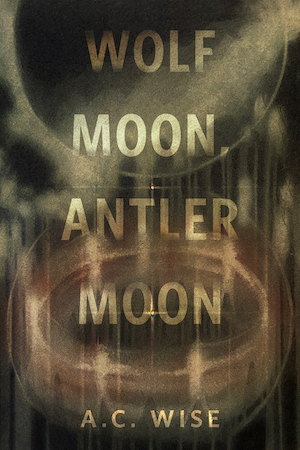
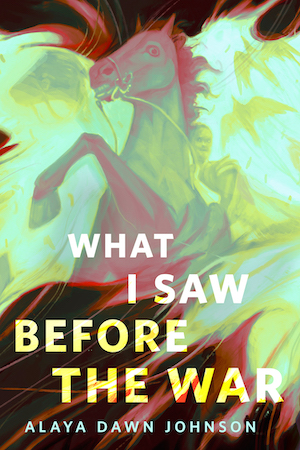





So, what did we learn today?
The humans are not alone in fitting blinkenlights to their covert ops communicators. Another few centuries of R&D, and they’ll cut it down to perky chirps. And the shuttles are armed. Is that new?
I’m not sure how I think about the Vulcan approach to planetary sovereignty. How they deal with their dissidents is up to them, it seems, as long as they take their Vulcan advice meekly. And how did the Vulcans ever keep their reputation that they don’t lie?
Was the getting-out-of-the-ropes sequence supposed to be eye candy? If they had spent less time speaking and more time working the knots, they might have gotten out in time … to get killed, maybe.
@1: “Hey, Vulcans, do you lie?”
“No.”
“Is that a lie?”
“Since we do not lie, logic dictates that it must not be.”
“Huh… checks out. Hey everyone, Vulcans never lie!”
I found this episode rather unfocused. It’s got some cute business with Shran wanting to repay his debt so he can get some sleep — it establishes that he has integrity, but in a way that maintains his irascibility and unfriendlines. But unfortunately, the part that stands out most in my memory is the sophomoric bondage sequence. This show’s producers had a terrible approach to sex appeal, contriving to put the female leads in accidentally revealing or (supposedly) titillating situations, which took away their agency and consent and was thus rather prurient. There’s a lot about TOS we justifiably see as sexist, but at least the female characters there were usually trying to be sexy and seductive, so they had more agency than T’Pol getting Archer’s face mushed against her chest or Hoshi in the season finale losing her top when she drops out of a vent.
It occurs to me I haven’t mentioned how miscast I felt Gary Graham was as Soval, at least initially. I first got to know Graham as the lead of the Alien Nation TV series from 1989-97 (counting the revival movies), and he did a great job there playing a very emotional character, a constantly angry guy who had a sensitive soul and wore his heart on his sleeve. But I felt for most of ENT’s run that he did a poor job dialing back his emotional intensity enough to be convincing as a Vulcan. It wasn’t until season 4 that I felt he finally got a handle on Vulcan acting, and after that he was quite good at it.
Although as the series went on, a lot of other actors would have similar issues, playing Vulcan characters with far too much emotionality — Robert Foxworth as Administrator V’Las in season 4 in particular. But by then, it kind of worked in the stories’ favor, since it was established that the Vulcans had lost touch with Surak’s true teachings.
I first saw Gary Graham in the legendary, thoughtful, nuanced, artistic triumph known as… Robot Jox. He was pretty emotional there, too.
@4/Delos: Oh yeah, Robot Jox. Not a bad film, actually, for what it was. It had a pretty smart script by noted SF novelist Joe Haldeman, though it got somewhat dumbed down in rewrites.
Yup, Robot Jox is fun, in sort of that boffo social commentary school of sci-fi flick. Paul Verhoeven must’ve been a fan, I would imagine.
I believe it’s free to watch on Tubi or one of those other streamers right now.
I’m not going to lie, that bit with Captain Archer & T’Pol almost managing to wriggle their way out of their restraints struck me as a first-rate bit of physical comedy … right up until they made a boob of the ending (Although seeing those terrorists rush in right after Our Heroes got loose gave me the strong impression that those guards had been watching the entire time, quite possibly taking bets and maybe a bit TOO distracted by their surprise at these two ‘guests’ actually making a go of their escape).
Also, it’s absolutely delightful to see T’Pol get her due after being absolutely indispensable for so many episodes (Possibly even better than seeing Shran back in town, though it’s a close-run thing either way); it’s also amusing to see that Doctor Phlox’s tendency to pilfer from the plates of others alive & well (I’m beginning to suspect that the Denobulan sense of personal space extends no further than the outer limits of their skin!).
One interesting question this episode presents us is “What might have become of NX-01 with Captain Gardner in charge?” (While Ambassador Soval’s support for the man suggests somebody perhaps a little too in awe of the Vulcans, I doubt the Good Captain was anything but an exemplary professional – something Captain Archer occasionally struggles to be).
@3. ChristopherLBennett: In all honesty the fact that Vulcans are not actually emotionless (except for those who’ve pursued Logic all the way to Kolinahr) strikes me as adequate justification for some Vulcans being at least a little emotive – especially by comparison with Mr Spock, who (let us remember) has always had more to prove than most when it comes to walking the Way of Surak and was for much of his more life more a ‘Model Vulcan’ than a completely representative one (Very much in the same way Mr Worf was a ‘Model Klingon’).
To be honest I think the ideal Vulcan performance is controlled, not genuinely passionless (A balance that Ms. Blalock has proven herself to be rather good at striking thus far in the rewatch; in all honesty that’s something I missed on my first encounters with ENTERPRISE, during it’s initial run), although I do agree that sort of feeling is better kept simmering beneath the surface than bubbling up around the edges.
“And T’Pol falling boobs-first on Archer was just cringe-inducing.”
So very cringe. Bakula talking to John Stewart about it is also cringe:
https://www.cc.com/video/09l92h/the-daily-show-with-jon-stewart-scott-bakula
At the time I didn’t care much for T’Pol, but rewatching the series I can only commend Blalock for doing as well as she did with such limited material.
@7/ED: Of course Vulcans aren’t emotionless, but my point is that there’s a right and a wrong way for an actor to emote as a Vulcan. The right way is the way Nimoy did it, by internalizing the emotion and expressing it subtly beneath a surface of control and discipline. Tim Russ and Jolene Blalock did it fairly well also. When they wanted to convey irritation, for instance, they did it with a subtle tension to the voice, a slight narrowing of the eyes or lips. Compared to that, Soval’s shows of irritation in seasons 1-2 were practically J. Jonah Jameson tantrums.
@5 – “”it’s as if I’d had a child who started out well and then sustained brain damage.”” Joe Haldeman on Robot Jox.
And yet, seven years later and with a whole new production crew, they still had Kirk grabbing Uhura’s breasts and grinning at her during the bar fight. Instead of her silly pushing him off of her, she should have been the one to deck him and knock him out cold.
It seems that Star Trek never learns.
Watching this makes me wonder how the galaxy wasn’t in a state of perpetual war until Archer and the rest of the humans showed up. Nobody seems to get along with anyone else without at least the suggestion of force. It would have been interesting to see what happens when Starfleet screwed up but good. How would humanity react? How would the crew? The Vulcans? But. our intrepid crew are the ones in the credits so they always have to come out on the right side of things, even though mistakes happen in the real world.
Let’s see Archer doing what he things is the right thing and pushing an alien race to do something that turns out horribly wrong because he didn’t fully understand the situation or the races invited and how they would react. Show us something going so badly that it brings in the Prime Directive.
Instead, we get these guys versus those guys versus those other guys with Archer in the middle working it all out 5 minutes before the end of the episode so we have time for the tag.
Yes, this is a follow up to a prior episode but the destruction of the monastery plays a surprisingly small part. Mostly, it’s played to give Shran a chance to get out of Archer’s debt. And speaking of Shran, has he been following the Enterprise, just waiting for such a chance? If not, then space, which should be very, very big is shown as very, very small.